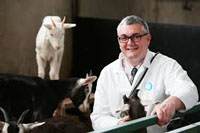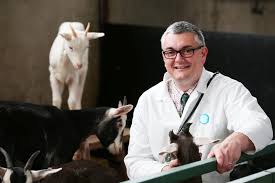
Simon Doherty

Photo courtesy of the BVA
Dr. Simon Doherty, president of the British Veterinary Association, is pleased the government recognizes that the profession faces a shortage of skilled labor. A coming rule change will make it easier for veterinary practices to hire foreign nationals.
An anticipated rule change in the United Kingdom making it easier to hire foreigners is providing some comfort to veterinary practices facing shortages of skilled workers caused by the country's potentially explosive exit from the European Union.
Some British practitioners, however, fear the rule change won't be enough to plug the labor gap, prompting them to offer more flexible workplace arrangements in a bid to attract and retain talent.
In a big win for the industry, the ruling conservative government has pledged to return veterinarians to the country's so-called Shortage Occupation List sometime this fall. The move, reversing a loss of such status in 2011, would mean practices no longer have to advertise positions to locals before they could hire a foreigner. It also would cut foreign workers' visa fees.
"Anything that promotes recruitment to satisfy the shortfall that we currently have across the [industry] is to be applauded," said Dr. John Blackwell, clinical director and partner at the Brownlow Veterinary Centre in Shropshire, England.
However, Blackwell added, "Many of my much-valued non-U.K. European veterinary colleagues remain anxious of their position and status within the U.K. veterinary sphere."
Non-U.K. EU nationals comprise almost a quarter of veterinarians working in the U.K., according to the British Veterinary Association (BVA). Their enthusiasm for staying has been waning since 2016, when the country voted to leave the EU in a process known as Brexit.
More than three years since the vote, a cloud of uncertainty remains over exactly how, when, and even if Britain will leave. Things got murkier last week, when new conservative Prime Minister Boris Johnson lost a crucial parliamentary vote on his aggressive Brexit strategy, prompting him to push for national elections that current polling suggests he is favored to win.
Johnson is giving serious consideration to crashing Britain out of the EU without any transitional deal, potentially trashing the residency rights of millions of EU nationals. The Brexit debate has for years been stoking anti-foreigner sentiment, and some EU-born veterinarians packed their bags long ago.
The decision to return veterinarians to the Shortage Occupation List followed intense lobbying by industry bodies, including the BVA and Royal College of Veterinary Surgeons (RCVS), and a recommendation in May by the government's Migration Advisory Council.
The council's recommendation was accepted on July 23 by then-home secretary Sajid Javid, who has since been made chancellor by Johnson in a cabinet reshuffle and replaced by right-wing hardliner Priti Patel.
A spokesperson for Patel's office declined to comment explicitly on what the recent change in minister, or a potential new government, could mean for the approved rule update. He did, however, imply that the government's position had not changed by referring the VIN News Service to the most recent ministerial statement made on the subject, dated July 23.
In that statement, Javid said veterinarians would go back on the Shortage Occupation List as part of the "Autumn Rule Changes." The government spokesperson declined to identify the specific date of those changes.
The BVA, the country's chief organization representing the profession, assumes the update is still coming. "Obviously, there's been a change in cabinet, but the decision was pretty much made," BVA president Dr. Simon Doherty said via telephone. "Our understanding is that once the Autumn Rules are updated, we'll go back on the list."
Veterinary-school intake to jump, stoking oversupply concerns
Doherty said he is "delighted" by the government's pledge, and pushed back against the notion that relaxing visa restrictions would more than fill a workforce shortage and create a new problem: an oversupply of veterinarians.
Such concerns were sparked by plans announced last year by Harper Adams and Keele universities to open Britain's eighth veterinary school in 2020. Further, the University of Nottingham said this year that it would increase its annual veterinary school intake by about 150 seats.
Doherty noted that even if those two schools added 250 more students a year, the first cohorts will not graduate for five to six years.
The issues caused by Brexit are far more pressing: Of the roughly 2,400 new veterinarians to register with the RCVS each year, Doherty said, only about 1,100 are U.K.-born. Of the remaining 1,300, about 300 come from outside the EU — from places such as Australia and the U.S. — leaving 1,000 coming from the European mainland.
Doherty also stressed that the industry's skills-shortage problem goes beyond Brexit.
"We know anecdotally that there are lots of vets that are seven-to-10 years qualified throwing their arms up and saying 'I've had enough of this,' " he said. "They've got friends earning twice as much money as them, and [they're] wondering 'Why am I doing this?' "
Younger graduates have told VIN News that they are being driven out of the profession by relatively low pay and unusual hours that can intrude on their personal lives. Veterinarians in the U.K earn between £30,000 and £50,000 on average per year (US$37,000 to US $62,000), government figures show, compared with the $93,839 median made by their U.S. counterparts, according to the U.S. Department of Labor.
More experienced veterinarians, meanwhile, are losing the incentive to set up their own practices due to the rise of deep-pocketed corporate consolidators.
Blackwell is among 10 veterinarians, including two from mainland Europe, currently working at the Brownlow Veterinary Centre, which recently was acquired by Independent Vetcare, one of the largest practice owners in the U.K. and Europe. "We continue to struggle to recruit, particularly colleagues with experience," he said. "And we have certainly had to move with the times regarding more flexible working initiatives, including job sharing."
The U.K.'s largest listed veterinary company, CVS Group, also is grappling with labor shortages in the wake of the Brexit vote. In January, it increased clinical salaries by 8%, a move that prompted it to issue a profit warning. The pay hike appeared to ease its workforce crunch, lowering the company's average veterinarian vacancy rate from a 12.5% peak in April — although it still averaged 8.4% for the six months through June 30. CVS said in a more recent update that it did not see the need for further above-inflationary pay increases "at the current time."
CVS also is offering job shares and weekend-only work to try to shrink its vacancy rate. Recently, it announced that it will create the U.K.'s first corporate-backed network of traveling clinicians, with the aim of improving practice capabilities, and also to retain staff.
CVS plans to have the network's first veterinarian in place by November; four to six practitioners by the end of the year; and 20 to 30 in two years' time, network manager Dr. Ben Walton told VIN News.
The network will consist of what are known in Britain as '"advanced practitioners": experienced veterinarians who are officially recognized by the RCVS, the profession's regulatory body, as having specialist knowledge but who are not formally trained as specialists. Based from their respective homes, each will service specified geographic zones across the country, using company-provided cars.
"The network improves access to advanced clinical expertise for pets and their owners, which is great," Walton said via telephone. "But it also opens up a whole set of career opportunities for experienced vets, who are becoming increasingly hard to retain."
Participants — who could include EU nationals — will get to work exclusively in their preferred clinical discipline, rather than just getting thrown the odd case. "An advanced practitioner in cardiology might only get to spend 5% of their time on cardiology at a single practice," Walton explained. "They're going to get bored, they're going to get disillusioned and they're going to move on."